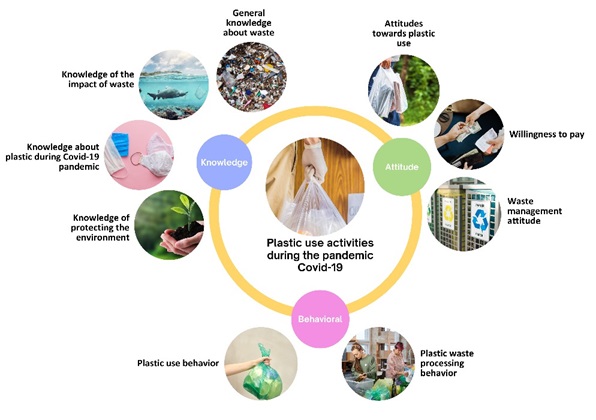Document Type : ORIGINAL RESEARCH ARTICLE
Authors
1 School of Environmental Science, Universitas Indonesia, Central Jakarta, DKI Jakarta, Indonesia of Environmental Science, Universitas Indonesia
2 Research Cluster of Interaction, Community Engagement and Social Environment, School of Environmental Science, Universitas Indonesia, Central Jakarta, DKI Jakarta 10430, Indonesia
Abstract
BACKGROUND AND OBJECTIVES: Plastic waste in Indonesia increased significantly during the Covid-19 pandemic. With this surge in plastic consumption and waste, awareness of environmental sanitation becomes essential, especially regarding the use of plastic. Society must consider the impact of single-use plastics and implement good plastic waste management. This study aimed to determine the environmental awareness of a community and what factors contributed to its plastic waste utilization activities during the Covid-19 pandemic.
METHODS: The data collection in this study was conducted using a questionnaire with a cross-sectional analytical approach. The study was conducted in Makassar City, South Sulawesi, the largest city in Eastern Indonesia, and purposive sampling was used to determine selected respondents. Data analysis was carried out using chi-square to identify partial relationships and logistic regression to distinguish relationships simultaneously.
FINDINGS: This study found that 53.2 percent of respondents frequently used plastic during the Covid-19 pandemic. Partial relationship analysis showed that general knowledge about waste and its impact was not significantly related to plastic use activities during the pandemic. Meanwhile, knowledge about plastic use during the pandemic, knowledge of protecting the environment, attitudes toward plastic use, attitudes toward waste management, behavior toward plastic use, and behavior regarding processing plastic waste were significantly related to plastic use activities during the Covid-19 pandemic, with respective test values of 0.000 each. Willingness to pay was also significantly related to plastic use activities during the pandemic, with a test value of 0.007. Simultaneous analysis showed that knowledge about plastic use during the pandemic was related to plastic use activities during the same time frame, with an odds ratio value of 0.398 and a negative relationship direction. Plastic waste-processing behavior was the most dominant factor influencing plastic use activities during the Covid-19 pandemic, with a test value of 0.000 and a positive relationship direction. Respondents who did not have good waste management behavior were 3.963 times more likely to use plastic frequently in their daily activities during the pandemic.
CONCLUSION: The study results show the importance of increasing knowledge regarding plastic use and waste management. Good knowledge will intervene in attitudes that encourage good behavior. This study focuses on the relationship between plastic processing behavior and the intensity of plastic use during the Covid-19 pandemic. It emphasizes the need for intervention in the form of education about the importance of protecting the environment and providing facilities that enable people to implement good waste-processing behavior.
Graphical Abstract
Highlights
- There has been a significant increase in plastic, 53.2% of respondents often use plastic daily during the Covid-19 pandemic;
- Knowledge of plastic use during the Covid-19 pandemic simultaneously influences plastic use activities during the Covid-19 pandemic;
- Plastic waste processing behavior is the most dominant determinant influencing plastic use activities during the Covid-19 pandemic.
Keywords
Main Subjects
OPEN ACCESS
©2024 The author(s). This article is licensed under a Creative Commons Attribution 4.0 International License, which permits use, sharing, adaptation, distribution and reproduction in any medium or format, as long as you give appropriate credit to the original author(s) and the source, provide a link to the Creative Commons license, and indicate if changes were made. The images or other third party material in this article are included in the article’s Creative Commons license, unless indicated otherwise in a credit line to the material. If material is not included in the article’s Creative Commons license and your intended use is not permitted by statutory regulation or exceeds the permitted use, you will need to obtain permission directly from the copyright holder. To view a copy of this license, visit: http://creativecommons.org/licenses/by/4.0/
PUBLISHER NOTE
GJESM Publisher remains neutral concerning jurisdictional claims in published maps and institutional affiliations.
CITATION METRICS & CAPTURES
Google Scholar | Scopus | Web of Science | PlumX Metrics | Altmetrics | Mendeley |
CURRENT PUBLISHER
GJESM Publisher



Letters to Editor
[1] Letters that include statements of statistics, facts, research, or theories should include appropriate references, although more than three are discouraged.
[2] Letters that are personal attacks on an author rather than thoughtful criticism of the author’s ideas will not be considered for publication.
[3] Letters can be no more than 300 words in length.
[4] Letter writers should include a statement at the beginning of the letter stating that it is being submitted either for publication or not.
[5] Anonymous letters will not be considered.
[6] Letter writers must include their city and state of residence or work.
[7] Letters will be edited for clarity and length.
Send comment about this article